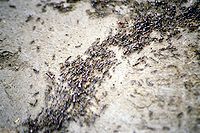
Photo from wikipedia
At a macroscopic level, part of the ant colony life cycle is simple: a colony collects resources; these resources are converted into more ants, and these ants in turn collect… Click to show full abstract
At a macroscopic level, part of the ant colony life cycle is simple: a colony collects resources; these resources are converted into more ants, and these ants in turn collect more resources. Because more ants collect more resources, this is a multiplicative process, and the expected logarithm of the amount of resources determines how successful the colony will be in the long run. Over 60 years ago, Kelly showed, using information theoretic techniques, that the rate of growth of resources for such a situation is optimized by a strategy of betting in proportion to the probability of pay-off. Thus, in the case of ants, the fraction of the colony foraging at a given location should be proportional to the probability that resources will be found there, a result widely applied in the mathematics of gambling. This theoretical optimum leads to predictions as to which collective ant movement strategies might have evolved. Here, we show how colony-level optimal foraging behaviour can be achieved by mapping movement to Markov chain Monte Carlo (MCMC) methods, specifically Hamiltonian Monte Carlo (HMC). This can be done by the ants following a (noisy) local measurement of the (logarithm of) resource probability gradient (possibly supplemented with momentum, i.e. a propensity to move in the same direction). This maps the problem of foraging (via the information theory of gambling, stochastic dynamics and techniques employed within Bayesian statistics to efficiently sample from probability distributions) to simple models of ant foraging behaviour. This identification has broad applicability, facilitates the application of information theory approaches to understand movement ecology and unifies insights from existing biomechanical, cognitive, random and optimality movement paradigms. At the cost of requiring ants to obtain (noisy) resource gradient information, we show that this model is both efficient and matches a number of characteristics of real ant exploration.
Journal Title: Journal of the Royal Society Interface
Year Published: 2019
Link to full text (if available)
Share on Social Media: Sign Up to like & get
recommendations!